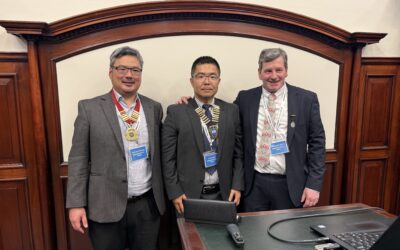The May meeting of the branch was a hybrid presentation from the Palm Court Hotel by Martin Worth, Director, Plant Integrity Management (PIM), entitled: SECEs: It’s time for a rethink!
The recent anniversary of the Piper Alpha disaster reminds us all of the need for effective safety controls. Our UK Oil and Gas industry was shaken to its core on 6th July 1988, when 167 people perished in the fire and explosions, and many others were traumatised and injured.
The subsequent Cullen inquiry, which took 2 years to complete, led to the Safety Case Regulations* being established, and the Offshore Industry thereafter moved to a goal setting safety regime, characterised by the introduction of PFEER (Prevention of Fire and Explosion, and emergency Response on Offshore Installations), and DCR (Design and Construction Regulations) – put in place to ensure that duty holders of offshore installations dealt appropriately with the requirements to provide measures to prevent, mitigate and respond to major accidents. * See, HSE website:
The Offshore Installations (Safety Case) Regulations 2005 – SPC/ENF/158 (hse.gov.uk)
Prior to the Safety Case Regulations there was the 1974 Offshore Installations Regulations, which required that there was an Operations Manual and a Certificate of Fitness. These were prescriptive regulations, and were all about certification. These documents were essentially ‘How to build and operate an offshore platform’ and specified six organisations that you needed to use to certify your platform operation.
Piper Alpha Incident 6 July 1988
Lord Cullen Enquiry Report.
However, during the Cullen enquiry there was the immediate introduction of the “Forthwith Studies”, in advance of, and in preparation for, the Safety Case requirement for each asset by UK Operators. These identified areas requiring priority attention:
• Emergency Systems Review (ESR)
• Smoke and Gas Ingress (SGI)
• Fire Risk Analysis (FRA)
• Evacuation, Escape & Rescue (EER)
This was put together by large teams within the industry, but was second guessing what might be required when the Safety Case regulations came out.
These new Safety Case Regulations involved a formal Safety Assessment process, based on goal setting.
1. Identify Major Accident Hazards (MAH)
2. Identify all Mitigation Measures and Barriers
3. Specify Measures (SECEs and Performance Standard Criteria)
4. Apply the Performance Standards Process (Maintain/Assure/Verify)
Performance standards based around Functionality, Availability, Reliability and Survivability became the norm. Today, these are referred to as the “Safety and Environmental Critical Elements (SECE)”, and according to the regulations, can be either hardware or software based, including management systems.
Setting performance standards for certain types of hardware can be very challenging. For example, a performance standard for a pipe or vessel may state that it shouldn’t leak, but in practice we shouldn’t be waiting for items to leak before we consider them to have failed as SECEs.
Martin debated that any hardware-based system shouldn’t be the principal SECE, and that while many operators today claimed to be carrying out assurance, in practice some were doing little more than performing inspections, incorrectly leaving the assurance elements of the process to the verifier.
Following on from this, Martin suggested that changing the emphasis of SECEs to focus on Management Systems and Integrity Management Systems (IMS) would deliver increased efficiency and reduced costs. As, if it can be demonstrated that the IMS is well formulated and correctly implemented, this will automatically confirm that the elements it covers are inspected, their functionality confirmed, anomalies managed, repairs carried out, backlogs controlled, planning addressed, and their condition endorsed. Thus, removing the need for the specific assurance of individual items.
Martin’s presentation was very thought provoking and again featured significant international attendance with a comprehensive Q&A following the event.
The Presenter
Martin graduated from the University of Liverpool in 1988 with a First-Class Honours degree in Physics, and has had over 30 years of experience within the field of safety management in the oil and gas industry, and was one of PIM’s founding Directors. As an established figure within the oil and gas industry, his breadth and depth of experience has been gained through a variety of technical safety roles within both operator and consultancy environments, specialising in safety management but having particular interests in the linked fields of: risk management, process safety and risk-based decision making.
Upcoming Events
The branch is now looking forward to its AGM planned for September 2022, ahead of the start of the new technical sessions at which a new committee will be elected.
The next event of the 2022-2023 calendar after the Annual
Corrosion Forum in August, will be a joint one with TWI. This will be given by Neil Gallon, Principal Engineer of Rosen, with a talk on “Re-purposing of Pipelines for Energy transition” – Thursday 22nd September 2022 at 6pm. Abstracts of potential papers for its Technical Programme are always welcome, and anyone wishing to join committee should correspond with: Hooman Takhtechian, htakhtechian@oceaneering.com
Process Pre-Safety Case Regulations.
Process Post-Safety Case Regulations.


